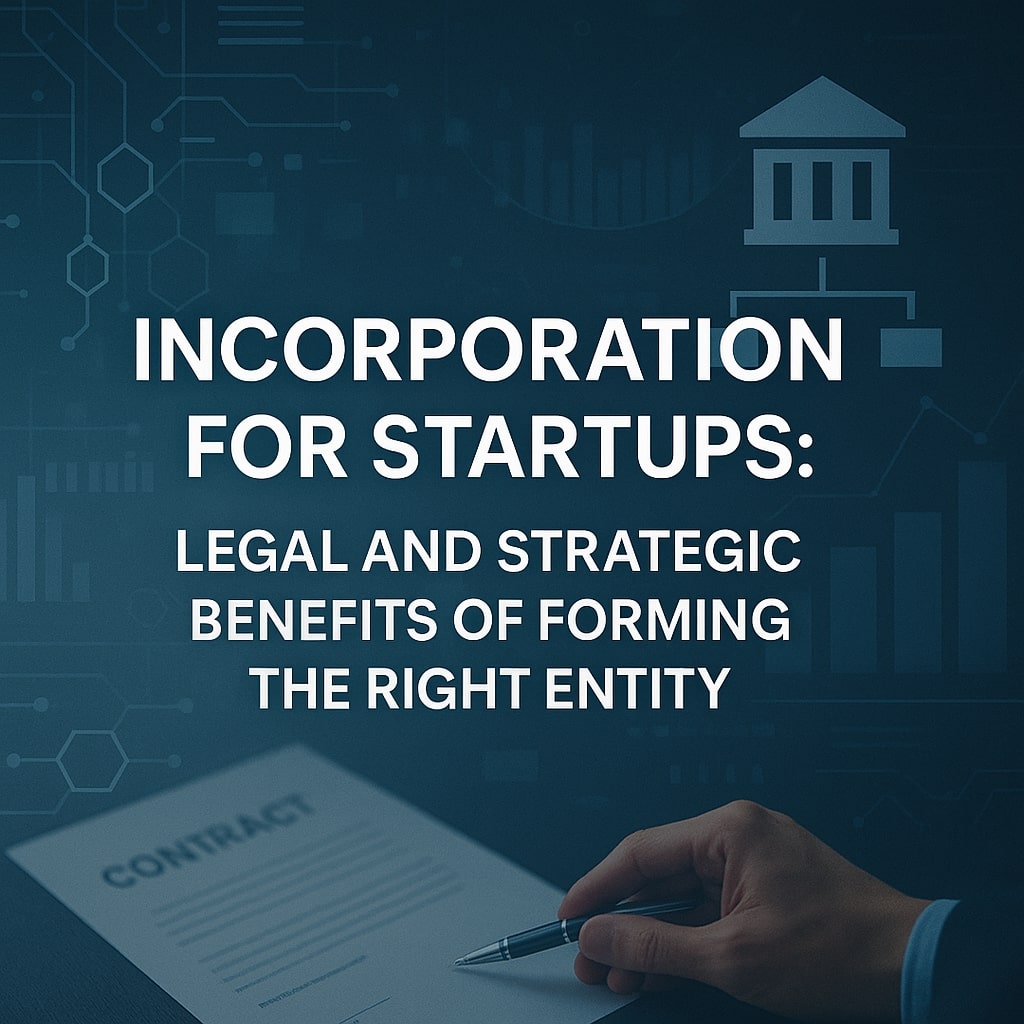In this article, L.A. Tech and Media Law Firm, a technology law firm in Los Angeles, explains the legal strategy and essential documentation behind incorporation for startups—from entity selection to IP assignments and founder stock structuring.
Why Is Incorporation So Important for Startups?
Founders often start building before forming a legal entity—but that delay can create problems down the line. Whether you’re developing software, offering digital services, or preparing to raise capital, incorporation is the legal foundation of your startup.
Without it, you may expose yourself to unnecessary personal liability, tax inefficiencies, and future ownership disputes. Properly incorporating your startup is also essential for IP protection, investor readiness, and revenue generation.
What Legal Structures Are Available to Startups?
When considering incorporation for startups, founders have several options. Each entity type carries unique advantages and trade-offs depending on your goals, team size, funding plans, and industry.
Here’s a breakdown:
- Sole Proprietorship: Easiest to form but offers no liability protection. Not ideal for startups intending to scale or raise capital.
- General Partnership: Useful in some service industries but exposes partners to joint liability and may complicate tax filings.
- LLC (Limited Liability Company): Offers liability protection and pass-through taxation. Flexible, but may require conversion to a corporation before VC funding.
- C Corporation (Delaware or California): Standard for high-growth startups. Preferred by venture capitalists due to familiar stock structures, scalable equity issuance, and strong governance features.
Forming a Delaware C Corp is often the best move for venture-backed startups or those planning to issue stock options, raise significant capital, or exit via acquisition.
What Is Included in a Startup Incorporation Package?
At L.A. Tech and Media Law Firm, incorporation for startups includes more than just filing a form. We advise founders on every component of legal structure, ownership, and governance:
- Entity Formation: File Articles of Incorporation (or Organization), choose tax classification, secure name reservation, and obtain EIN.
- Founders Stock Issuance: Prepare stock purchase agreements, founder vesting schedules, and cap table alignment.
- Bylaws or Operating Agreements: Document internal governance rules, including voting thresholds and decision-making protocols.
- Initial Board Resolutions: Appoint directors, approve equity grants, and authorize bank accounts.
- IP Transfer Agreements: Assign all intellectual property created by founders or contractors to the newly formed entity.
- Compliance Documents: Assist with state franchise filings, 83(b) elections, and registered agent setup.
When Should a Startup Incorporate?
A common question from early founders is: “Should I wait until I get funding to incorporate?”
The answer is almost always: incorporate sooner. Here’s why:
- IP Ownership: Without an entity, founders often own IP personally, leading to messy disputes or broken acquisitions later.
- Co-Founder Disputes: Clear stock allocation and vesting terms early on help prevent costly founder fallouts.
- Investor Readiness: Angels and VCs expect a clean cap table and legal structure before committing funds.
- Client & Vendor Confidence: Even basic service agreements look more professional coming from a legitimate business entity.
- Tax Planning: Early incorporation allows founders to take advantage of QSBS (Qualified Small Business Stock) tax exemptions and make timely 83(b) elections.
What Are the Risks of Delaying Incorporation?
Startups that delay incorporation may run into several problems:
- IP Disputes: If code or product development happens without proper IP assignment, it may be impossible to prove company ownership of core assets.
- Founder Exit Chaos: Without written founder agreements and stock vesting, an exiting co-founder may walk away with unearned equity.
- Funding Bottlenecks: Investors will delay or walk away if the entity structure is unclear or unformed.
- Tax Surprises: Failing to file 83(b) elections within 30 days of stock grants can result in unexpected tax bills later.
 How Does Incorporation Protect Intellectual Property?
How Does Incorporation Protect Intellectual Property?
Intellectual property is the lifeblood of many startups. Incorporation allows you to formally assign IP to the company and consolidate rights under a single owner—vital for branding, licensing, and M&A.
Here’s how we ensure clean IP transfer:
- Founder IP Assignment Agreements
- Independent Contractor IP Provisions
- NDA/Confidentiality Agreements During Pre-Formation Periods
- Technology Transfer Protocols
This ensures that the startup—not individual founders—owns all branding, code, product designs, logos, and inventions.
What Paperwork Do Founders Need to Sign?
To complete incorporation for startups, founders typically execute the following:
- Stock Purchase Agreements
- Bylaws or Operating Agreement
- Initial Board Resolutions
- IP Assignment Agreements
- 83(b) Election Forms
- Banking Resolutions
We also assist with IRS EIN setup, California Secretary of State filings, and registered agent services.
What Is the Cost of Incorporating a Startup?
Costs can vary depending on the jurisdiction, type of entity, and complexity of the ownership structure. At L.A. Tech and Media Law Firm, we offer flat-fee packages for early-stage startups that include:
- Full legal consultation
- Custom stock and governance documents
- IP assignment contracts
- Filing and compliance support
This ensures your startup has a strong legal foundation without breaking the bank at the pre-revenue stage.
What Happens After Incorporation?
Once incorporated, your legal obligations don’t stop. Founders must maintain proper compliance, including:
- Annual Statements of Information
- Delaware Franchise Tax Filings
- Board and Shareholder Meetings
- Proper Contract Practices
- IP and Trademark Filings
We continue working with clients after incorporation to ensure compliance and assist with fundraising, IP protection, and eventual acquisition planning.
Best Incorporation Attorney for Los Angeles Startups:
If you’re a Los Angeles based startup considering launching a technology venture, don’t leave your company structure to chance. Early incorporation for startups provides legal clarity, protects intellectual property, and sets the stage for future growth and investment. David Nima Sharifi, Esq., founder of L.A. Tech and Media Law Firm, is a nationally recognized startup attorney with decades of experience advising founders on entity formation, founder agreements, and strategic IP transfers. Schedule your confidential consultation now by visiting techandmedialaw.com or using our secure contact form.



